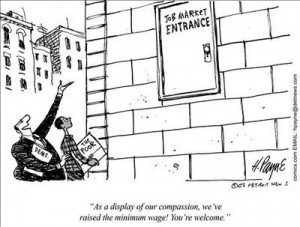Should the federal government make life more difficult for low-skilled workers?
I hope everyone will emphatically say “NO!”
Heck, most people understandably will think you’re crazy for even asking such a preposterous question.
But some of those people will also think that it’s a good idea for politicians in Washington to make low-skilled workers less attractive to employers by raising the minimum wage.
I often ask such people whether they are more likely to buy a Big Mac if McDonald’s raises the price by 24 percent. They say they are less likely.
I then ask them if they are more likely to buy a car if GM increases the price of a Buick by 24 percent. They say less likely, of course.
But they seem to have a blind spot when I ask them whether employers will be more likely or less likely to hire low-skilled workers when the government increases the cost of those workers by 24 percent.
I explain further in this interview for Yahoo! Finance.
The interviewer, by the way, seems to be economically illiterate.
He apparently believes that we can reduce inequality by pricing poor people out of the job market. He also blames companies for sitting on piles of cash, presumably unaware that firms only will invest if there are profitable opportunities.
 At one point, I delicately state that one of his questions “betrays a certain lack of historical knowledge,” which is a polite way of saying “you’re either lying or you have no idea what you’re talking about.”
At one point, I delicately state that one of his questions “betrays a certain lack of historical knowledge,” which is a polite way of saying “you’re either lying or you have no idea what you’re talking about.”
Ultimately, I try to help him understand by comparing fast-growing economies such Hong Kong and Singapore, which have relatively low burdens of government, with slow-growth economies such as France and Italy, where politicians ostensibly seek to “help” people with various forms of intervention.
I’m not sure I made any progress, so feel free to suggest other ways of convincing skeptics that freedom is better than statism.
Anyway, for those who want more information, this video explains the underlying economics of the minimum wage. We also have plenty of evidence (see here and here) that unemployment rose following the most recent hike in the minimum wage.
